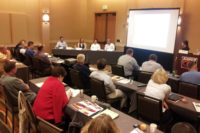The choice of Jeffrey “Skunk” Baxter as keynote speaker at PSA-TEC was out of the ordinary, but served to let integrators see how they could think outside of the box. The keynote address was sponsored by Samsung Techwin America; Frank DeFina, senior vice president of Sales and Marketing, North America, introduced Baxter as a Grammy Award winning musician, best known for his work with the bands, Doobie Brothers and Steely Dan. Most people didn’t know that Baxter also advises top military and civilian groups on such national security matters as missile defense; biological, chemical and other weapons of mass-destruction; terrorism, asymmetrical warfare such as information warfare and cyber war; and strategic, out-of-the-box thinking. His innovative approaches to problems and issues have made him a frequent participant in Defense Department war-gaming.
Baxter stressed that there are many opportunities for expanding the types of services integrators offer to their clients — for example, situational awareness. “Situational awareness keeps you alive…being aware of what’s going on around you. You are extending situational awareness through the security systems you sell. You extend the eyes through video, the ears through audio, the human presence through thermal technology, the level of fear through increased ammonia levels people give off. I will leave it up to you to come up with innovative ideas to incorporate situational awareness in your business,” Baxter said.
An audience member asked: “What is our greatest threat? Is it cyber security? Is it a plane flying into a building? An SUV full of explosives in Times Square?”
“Keep going,” Baxter encouraged. “The cyber threat is huge. Down at an individual level, someone having their identity stolen is one thing. But what if you were a bank that had just spent $40 million on a project and in 30 minutes it was gone?”
Moderator and industry consultant Sandra Jones, Sandra Jones & Co., sparked another lively discussion with a simple question at Thursday’s State of the Industry panel: “What are the two most pressing issues affecting your constituents?” Panel members Bill Bozeman, president and CEO, PSA Security Network, Dave Carter, managing director, Security Network of America (SNA), Richard Chace, executive director and CEO, Security Industry Association (SIA), Paul Cronin, CEO, 1nService, Brian Hansen, specification engineer, Leviton and president, BICSI, and Chuck Wilson, executive director, National Systems Contractors Association (NSCA) shared concerns and recommendations on varied issues. These ranged from the shrinking margins of profitability on products and significant trend towards business models focusing on generating RMR, to the worth of designing certifications to bridge the gap between the physical and the IT and the need to form strategic partnerships in order to manage and become integral to several areas of a customer’s business.
Each panelist brought a distinctive point of view to the dialog and yet all seemed to agree on the importance of investing in education and training across the board: in technology, convergence trends, new legislation, and particularly, better business models. Bozeman pointed out that staying on top of new technologies is necessary, but that learning how to run a business and “making money” is crucial and that is where open communication with trade associations and partnerships can be most useful to integrators.
“Look inside the association. Pick out some peers that you respect, that you think are really good, and put an advisory board together,” Carter offered, stressing that it has proved remarkably helpful for industry folks “to meet quarterly at off-site places to talk out their issues.”
PSA-TEC’s new location at the Donald E. Stephens Convention Center offered even more networking opportunities than previous venues. With a 44 percent increase in show floor space and an open policy that gave non-PSA members a chance to register for the event, the exhibit hall allowed higher-than-ever numbers of vendors and integrators a chance to mingle as well as discuss new products and services.
The exhibition portion of PSA featured vendor presentations at the Show Floor Theater by comCables, CelAccess Systems, Biamp Systems, NSCA Building Connections, Schlage, e-Data, ACTAtek and AVAD, where companies got a chance to present products as well as explain their particular positions in the industry and how integrators can benefit from them.
In recognition of some of its vendor partners, PSA presented 30 awards in the categories of individual and team customer service, outstanding representation, outstanding vendors, outstanding new vendor, and rising star, star, and super star vendors, during a breakfast ceremony Wednesday that also featured a lengthy list of door prizes. The super star vendor awards went to Altronix, CSC and Exacq Technologies, who showed them off at their booths. Honorees were chosen through surveys completed by PSA members.
As most of these members will say, education is the focal point of PSA-TEC and its most valuable offering. This year, attendees were able to sign up for 141 different training sessions across three tracks: Business Optimization, Physical Security and Information Technology.
New this year were a Best Practices series of sessions presented by peer industry professionals in the Business Optimization track; networking classes in the IT track, and new certifications and demonstrations in the Physical Security track. The two-day certifications offered were OpenEye Premier Partner Certification, ESNT Certification from the Electronic Technician’s Association, Arecont Vision Channel Partner Certification and Fiber Optic Technician Certification from the Fiber Optic Association. A three-part NiceVision eXpress Technical Certification was also offered.
A highlight of the Business Optimization track was Jeff Kessler’s economic outlook for the electronic security industry. Targeted to systems integrators, Kessler, managing director, Institutional Sales and Trading at Imperial Capital, stressed that integrators’ services will be much in demand. “Far from being a dying industry, small and large integrators can thrive, despite what some bloggers have been saying;” however, new customer demands for lower installation prices and more services will hurt integrators’ businesses unless they retool, he said. Managed services and enhanced monitoring — recurring revenue based services — are what will bring back profit margins and keep customers “sticky” with long-term contracts.
Integrators need to cut their dependence on installation and product margins, Kessler emphasized. “The economy will recover; gross margins in product and installation will not,” he said. The IT model of 15 years ago is coming to the security industry; in the IT world, product margins of 7 to 9 percent are common. “Security will not go that low or it will be a disaster,” Kessler believes.
Physical security integrators need to embrace and sell a wide range of services to create value, he conceded. Examples of some of the services that can keep both margins and clients are: project planning and advisory; post-project advisory; third-party enhanced monitoring; managed access control and video; managed alarm verification; managed business services such as training, configuration and programming; maintenance contracts; and software licensing.
Despite a common belief that IT integrators will “take over” the physical security realm, Kessler doesn’t buy into that. “IT integrators will remain guardians of the network, not the security system. IT guys are not coming in and taking over, but the security integrators will have to learn to talk in more of an IT-centric fashion,” he said.
For information on PSA-TEC visit www.psatec.com.

